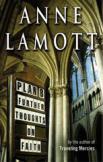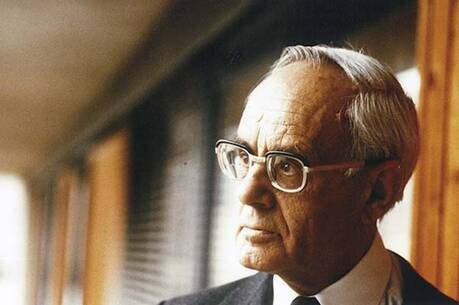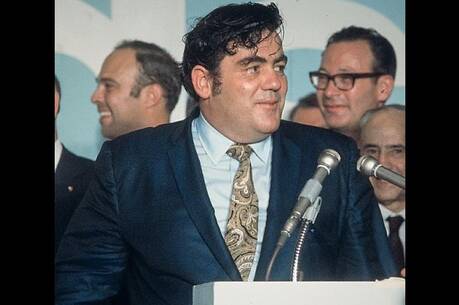Still Struggling
Anne Lamott strews many bitter and distracting political asides throughout her new book of essays, Plan B: Further Thoughts on Faith, but her honesty and humor rescue the book from being a polemic. As she did in Traveling Mercies, Lamott shares her day-to-day struggle to live as a Christian and the way God helps her through difficult situations, usually through some kind of epiphany.
In heat, for instance, Lamott writes that though she loves her teenage son, Sam, more than life itself, she has also threatened to have his pets put to sleep, or at least insinuated she would do this if he didn’t take better care of them. Parents yell, spank and jerk their children because they can. Who else is there that you can talk to like this? Can you imagine saying to your partner, You get off the phone now! No, not in five minutes’?
In Lamott’s view, children are often unreasonable and boring. She writes:
A few mothers seem happy with their children all the time, as if they’re sailing through motherhood, entranced. But up close and personal, you find that these moms tend to have little unresolved issues: they exercise three hours a day, or they check their husbands’ pockets every night, looking for motel receipts.
Lamott gives no answers, but her discussion lets welcome fresh air into the stuffy room of parental anger. The epiphany in this section comes when Sam still needs her after one of her outbursts, coming to snuggle with her like the baby spider pushing in through the furry black legs of the mother tarantula, knowing she’s in there somewhere.
Parents harbor anger not only toward their children, but toward their own parents. In one of the most moving pieces of Plan B, o noraht, noraht, the author describes how for two years she left her mother’s ashes in a brown plastic box in a closet because she was still so angry with her. Lamott writes that her mother ...was like someone who had broken my leg, and my leg had healed badly, and I would limp forever.
Eventually, however, she takes both her mother’s purse and the box out and goes through the purse. Her purse made my heart ache. She finally wraps the box of ashes in birthday gift paper, and later in the book, accompanied by members of her family, scatters the ashes. She admits here how excruciating it is to forgive someone who has hurt you, and how long the process can take. This is a theme that recurs in her other books as well. People do not change overnight.
The piece holy of holies 101 is about the struggles she and a friend experienced starting a Sunday school at her church, without much help from other church members. Lamott also asks for Mary’s help. You’re not supposed to love Mary so much, if you’re not Catholic, but I do. She quotes Archbishop Carlo Maria Martini writing that full of grace means You have been loved for a very long time.’ Knowing thisthat I could call on a woman who had been loved for so long, stretching backward and forward through millenniacould trump my self-loathing....
This same essay, however, has, in addition to the whiny political barbs, another troubling aspect. When God calls Lamott to start a Sunday school, Lamott wonders what to teach the children. Mary Oliver said something to the effect that the best sermon she ever heard was the sun. I thought, That’s the sort of thing we’ll teach. But don’t Christians, Protestant and Catholic, have more to teach than Mary Oliver’s poetry? Can’t they also tell stories from the Bible?
In Traveling Mercies, Lamott wrote that she accepted God after reading Søren Kierkegaard’s Fear and Trembling. The poet W. H. Auden was greatly influenced by the Danish philosopher as well. In the foreword to an anthology Auden edited, entitled The Living Thoughts of Kierkegaard, he writes:
The false kind of apologetics of which he accuses his contemporary Christians is the attempt to soft-pedal the distinction between Christianity and the Natural Religions, either by trying to show that what Christians believe is really just what everybody believes, or by suggesting that Christianity pays in a worldly sense, that it makes men healthy, wealthy, and wise, keeps society stable, and the young in order, etc.
Lamott indulges in the first kind of false apologetics; that is, she is a Christian, but throughout the book, and especially in her essay let us commence, a commencement speech, she does soft-pedal her Christianity. She uses the word spirit to cover the whole realm of religion and exhorts students to believe in somethingit does not matter which traditionand help the poor. It can be argued that Bush and company fall into the second kind of false apologetics, but surely it is better to fall into neither.
Lamott, however, is open to conversion, as her book makes amply clear. In a short essay entitled loving your president: day two, she hears a sermon about loving your enemies and tries to love President Bush. I felt a shift inside, the conviction that love waschanging my cold stone heart. The feeling grew stronger and stronger, until, unfortunately, church was over. On the next page she sums up her message: It [loving Bush] continues to be a struggle. I know that God is in the struggle with us.
This article also appeared in print, under the headline “Still Struggling,” in the August 29, 2005, issue.








